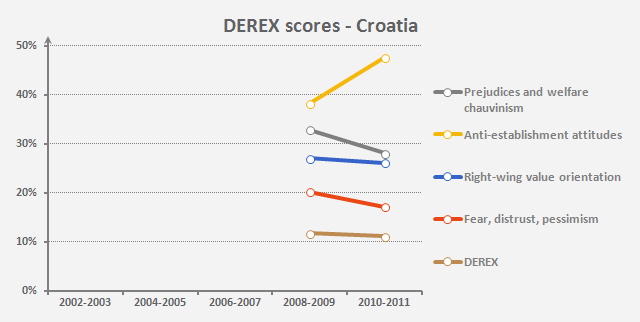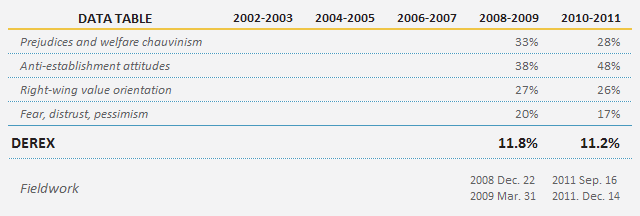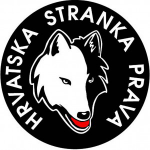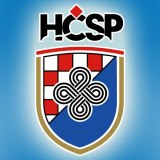Croatia
Factsheet
| ETHNIC MINORITIES: | |
|
Serb: Roma: Bosniak: Hungarian: |
4.5% 0.78% 0.5% 0.4% |
| RELIGIONS: | |
|
Roman Catholic: Orthodox: Muslim: |
87.8% 4.4% 1.3% |
| NET MIGRATION: | 10,000 |
| POP. GROWTH RATE: | -0.3% |
| GDP GROWTH: | -0.6% |
| GDP PER CAPITA: | 13,881 |
| UNEMPLOYMENT: | 17.6% |


Croatian Party of Rights (Hrvatska Stranka Prava, HSP)


The HSP (Hrvatska Stranka Prava) took its name from an organization established in 1861 by Ante Starcevic. At the time part of the Austro-Hungarian Empire, the organization kept an equal distance from the court in Vienna and the government in Budapest, and stood firmly behind the cause of Croatian national independence. However, its current incarnation doesn’t always refer to this formation as its spiritual predecessor. Today's HSP was formed during the Balkan war of the early 1990s. Its first chairman, Dobroslav Paraga, openly advocated a Fascist ideology. The party defines itself as a right-wing, conservative and Christian Democratic formation and categorically rejects comparison to the pro-Nazi Ustasa movement. Nevertheless, under the chairmanship of Paraga the HSP held up the Croatian fascist leader, Ante Pavelic as a role model. In fact, as late as 2012 it celebrated the 71st anniversary of the establishment of the Croatian Fascists puppet-state led by Pavlovic at the politician’s gravesite. At the same time, Daniel Srb, leading the party since 2009, has shifted the emphasis in HSP's policy from ethnic issues to the principle of citizenship and, rejecting the Pavlevic era, considers the independence struggle of the 1990s as the party's source of spiritual inspiration. Similar to other European far-right parties, HSP also opposes European integration. The party faces a deep crisis, reflected in recent election results. In 2007 prominent members left the organization and in 2013 Anto Đapić, the former chairman, who led the party between 1992 and 2009, was expelled. The party suffered the first major decline in popular support when, as opposed to 6.4% in 2003, in the 2007 general elections it received only 3.2%, and in 2011 it was forced out of Parliament.
HSP on the Internet:
Source:
- Political Capital

Croatian Pure Party of Rights (Hrvatska čista stranka prava, HČSP)

Similar to HSP, in its choice of name the party also wishes to define itself along the values laid down in 1861 by Ante Starevic. By its own definition, HCSP is a right-wing nationalist party that considers the radical representation of Croatian national interests as its primary mission. The organization was established in 1992 and is currently led by Josip Miljak. The HCSP is a far-right, radical formation that, similar to HSP, is guided by the ideology of Croatian national supremacy and a rejection of European cooperation. In addition, HCSP is also a radically anti-abortion and homophobic party advocating the permanent ban of same-sex marriages. The organization's anti-establishment stance is further reinforced by its firm anti-market and anti-capitalist ideology, often sprinkled with xenophobe and anti-Semitic diatribes. The party blames international plutocracy, Jews and personally György Soros for economic and social woes brought on by the global crisis. In its rhetoric the organization uses scaremongering (referring to Italian and Hungarian revisionist claims) aimed at scapegoating and demagoguery to exploit popular emotions. In general elections, the extra-parliamentary party has never received the level of support needed to enter Parliament. The party opposed joining the EU and NATO, and cooperation with the International Tribunal investigating Yugoslav war crimes.
HČSP on the Internet:
Source:
- Political Capital
European elections - May 25, 2014


Parliamentary elections - December 4, 2011

Source: Election Commission; EP2014
Our thematic websites
Political Capital's analyses and activities in English.
Research and advocacy programme focused on the role conspiracy theorising plays in shaping populist and radical politics.
Our project New electoral system in Hungary: watchdogging, advocacy and raising awareness focuses on the electoral reform in Hungary.
Our blog on political and societal extremism and conspiracy theories.
DEREX website is supported by










